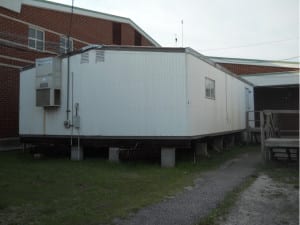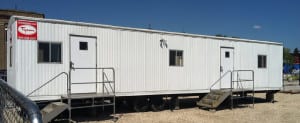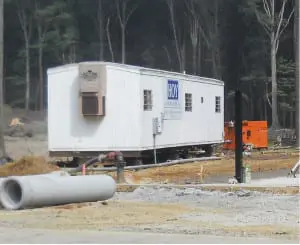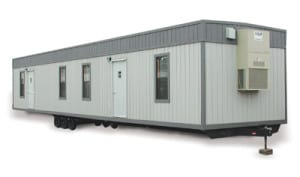
The Pros and Cons of Investing in a Used Jobsite Trailer
Investing in a used jobsite trailer is a decision many construction managers, project supervisors, and business owners face. While new trailers offer their allure, used ones present a budget-friendly alternative. However, like any investment, there are pros and cons to consider. This comprehensive guide will help you weigh these factors, ensuring you make an informed decision that suits your project’s needs.
Understanding the Benefits of Used Jobsite Trailers
Let’s dive a bit deeper into the advantages of choosing a used jobsite trailer. It’s like finding a gem in a pre-loved store; with the right eye, you can uncover something that perfectly fits your needs without breaking the bank. Here’s why going for a used jobsite trailer could be a smart move.
Stretching Your Budget Further
More Bang for Your Buck
Imagine you have a set budget for your project. Opting for a used trailer means you’re likely to get more space or features for the same amount of money you’d spend on a smaller, more basic new trailer. This choice can be especially beneficial for smaller businesses or startups where every dollar counts.
Keeping the Costs Down
In the world of construction and project management, keeping costs under control is often half the battle. A used jobsite trailer offers a practical solution – it serves the purpose without the hefty price tag of a brand-new model. It’s like buying a pre-owned car that’s still in great shape; you get the functionality without the premium cost of a new model.
Immediate Availability: Skipping the Wait
Ready When You Are
Unlike new trailers, which might come with a waiting period due to manufacturing or shipping, used trailers are often ready to go. When you’re working with tight project timelines, this immediate availability can be a game-changer. It’s like walking into a restaurant and getting a table right away, as opposed to waiting in line for your turn.
Hit the Ground Running
There’s no downtime waiting for your trailer to be ready. With a used trailer, you can get it delivered, set it up, and be operational in a fraction of the time it might take to acquire a new one. It’s all about efficiency and keeping your project on track.

A Green Choice: Eco-Friendly and Sustainable
Reduce, Reuse, Recycle
Choosing a used jobsite trailer is an environmentally responsible decision. It’s a form of recycling – giving a second life to a trailer that might otherwise be discarded. In a world increasingly conscious about sustainability, this choice aligns your project with eco-friendly practices.
Lowering the Carbon Footprint
Manufacturing new trailers requires materials and energy, contributing to a higher carbon footprint. By opting for a used trailer, you’re indirectly reducing the demand for new materials and energy consumption, which is a small but meaningful contribution to environmental conservation.
Depreciation: A Smarter Financial Move
Avoiding the Initial Depreciation Hit
New trailers, much like new cars, lose a significant portion of their value the moment they leave the lot. With a used trailer, the bulk of this depreciation has already occurred. What this means for you is that if you decide to resell the trailer later, you’re likely to recoup a larger percentage of your initial investment compared to a new trailer.
Long-Term Financial Sense
Consider this: If you purchase a used trailer and maintain it well, its value over the duration of your use might depreciate less in percentage terms than a new trailer. This aspect makes it a wise long-term financial decision for projects where a trailer is needed for an extended period.
Considering the Drawbacks
Maintenance and Repair Costs
While used trailers are budget-friendly upfront, they may come with hidden maintenance costs. Older trailers might need more frequent repairs or part replacements, which could add up over time.
Limited Customization
Used trailers often come as-is, with limited options for customization. If your project requires specific modifications or a particular layout, adapting a used trailer can be more challenging and potentially more costly than outfitting a new one.
Wear and Tear
The condition of used trailers can vary significantly. Some may have endured heavy use or harsh weather conditions, leading to wear and tear that could impact their functionality and appearance.
Shorter Lifespan
A used trailer, having already been through part of its functional lifespan, may not last as long as a new one. This reduced longevity might be a concern for businesses looking for a long-term investment.

Navigating the Decision-Making Process
Deciding to buy a used jobsite trailer is a bit like navigating through a bustling market – there are many options, and each choice seems better than the last. But, just like finding that perfect little shop in the market, knowing what to look for can lead you to a decision that suits your needs perfectly. Here’s how to steer through the decision-making process when choosing a used jobsite trailer.
Conducting a Thorough Inspection
Like a Detective on a Case
When you find a trailer you’re interested in, inspect it like a detective. Look for structural integrity, signs of significant wear or rust, and the condition of doors and windows. It’s like checking a used car – you wouldn’t buy one without looking under the hood and taking it for a test drive, right?
The Inside Story
Don’t forget the interior. Look for signs of leaks, water damage, or mold. Check if the electrical system, lights, and HVAC are in working order. It’s like checking a house before you move in – you want to ensure everything works and it’s comfortable to live in.
Weighing the Total Cost of Ownership
Upfront Costs vs. Long-Term Value
Sure, the sticker price is important, but think about the long-term value too. A cheaper trailer might end up costing more in repairs down the line. It’s like buying a budget tool that breaks after a few uses, compared to a slightly more expensive one that lasts for years.
The Hidden Extras
Remember, the purchase price isn’t the end of the story. Factor in potential refurbishment costs, transport to your site, and ongoing maintenance. It’s a bit like planning a vacation – you need to budget for more than just the plane ticket.
Assessing Your Project’s Specific Needs
Matching the Trailer to Your Project
Consider how the trailer will be used. Does the layout fit your needs? Can it be easily modified? It’s like choosing a new office space – does it have the right number of rooms, and can you set it up the way you like?
Legalities and Logistics
Check local zoning laws and whether you need permits for your trailer. Also, consider how you’ll get the trailer to your site. It’s a bit like planning an event – you need to make sure everything is legal and logistically possible.
Seeking Professional Advice
Don’t Go It Alone
If you’re unsure, seek advice from a professional. They can provide valuable insights, especially on the technical aspects. It’s like getting a mechanic to inspect a car before you buy it – they might spot things you’d miss.
Reputation Matters
Choose a reputable dealer. Look at reviews and ask around. A dealer with a good track record can provide peace of mind. It’s like picking a restaurant based on recommendations – you’re more likely to have a good experience.
Navigating the decision-making process when buying a used jobsite trailer involves a mix of careful inspection, considering the total cost, understanding your specific needs, and sometimes, seeking professional advice. By taking these steps, you can find a trailer that not only fits your budget but also meets your project requirements.

Top Tips for Successfully Investing in a Used Jobsite Trailer
Investing in a used jobsite trailer is a bit like embarking on a treasure hunt. You’re looking for something that offers value, meets your needs, and stays within your budget. To ensure your investment is a success, here are some top tips to guide you through the process. Think of it as your map to finding that hidden gem.
- Define Your Requirements: Before you start browsing, have a clear understanding of what you need in a jobsite trailer. This includes size, layout, and specific features like built-in desks or storage. It’s like going grocery shopping with a list – it keeps you focused and helps you avoid unnecessary purchases.
- Consider Future Projects: Think about not only your current needs but also potential future projects. A versatile trailer that can be adapted for different uses might offer better long-term value. It’s like buying a versatile piece of clothing that can be worn for various occasions.
- Research Different Models and Brands: Spend some time researching different types of trailers and their features. Learn about the most reputable brands and what makes them stand out. It’s like reading reviews before buying a new gadget – you want the best your money can buy.
- Understand Pricing: Get a sense of what used trailers typically cost. Knowing the market rate helps you spot a good deal and also ensures you don’t overpay. It’s similar to comparing prices before booking a hotel room – you want the best deal for the quality you’re seeking.
- Check for Damage and Wear: Inspect the trailer carefully for any signs of damage, such as rust, dents, or structural weaknesses. Pay close attention to the condition of floors, walls, and roofs. It’s akin to inspecting a used car – you’re looking for signs that might indicate future problems.
- Evaluate the Interior: Don’t just focus on the exterior. The interior is equally important. Check for functionality of built-in features, signs of leaks or water damage, and the condition of electrical fittings. It’s like touring a house before you decide to rent it – the inside needs to be just as good as the outside.
- Consider Transport and Setup Costs: Remember to factor in the cost of transporting the trailer to your site and any setup fees. Sometimes these hidden costs can add up. It’s like budgeting for a vacation – you need to consider travel insurance, transportation costs, and other extras.
- Budget for Modifications: If the trailer needs modifications or upgrades, include these in your budget. Customizing the trailer to fit your specific needs might require some additional investment. It’s similar to renovating a home – the purchase price is just the beginning.
- Choose a Trusted Dealer: Buy from a reputable dealer with good customer reviews and a track record of quality. A reliable dealer can provide valuable guidance and ensure that you get a trailer that meets your expectations. It’s like choosing a well-reviewed restaurant – the chances of having a good experience are higher.
Investing in a used jobsite trailer can be a savvy decision if approached correctly. By understanding your needs, conducting thorough research, inspecting potential purchases carefully, and considering all related costs, you can find a trailer that provides excellent value and serves your project effectively.

Ensure Legal Compliance with Used Jobsite Trailers
Check Zoning and Permit Requirements
Before making your purchase, make sure you understand the zoning laws and permit requirements of the area where you’ll be using the trailer. Different regions have different rules regarding the use of temporary structures like jobsite trailers. It’s like checking the local laws before setting up a business – you want to ensure everything is above board.
Consider Safety Standards
Safety is paramount. Ensure the trailer complies with all relevant safety standards and building codes. This is crucial not just for the well-being of those using the trailer, but also for legal compliance. It’s similar to ensuring a car passes its MOT – safety comes first.
Plan for Long-Term Maintenance
Regular Maintenance Checks
Once you’ve acquired your trailer, plan for regular maintenance. This includes checking for structural integrity, ensuring all electrical and plumbing systems are functioning, and preventing rust and corrosion. Think of it as regular health check-ups – they keep things running smoothly and prevent bigger issues down the line.
Set Aside a Maintenance Budget
Allocate a portion of your budget for ongoing maintenance. Regular upkeep can extend the life of your trailer and prevent costly repairs in the future. It’s akin to home maintenance – a little effort can go a long way.
Keep Records of Maintenance and Upgrades
Maintain a detailed record of all maintenance work and upgrades done on the trailer. This documentation can be valuable if you decide to sell the trailer in the future. It’s like keeping service records for a car – it provides proof of good maintenance to potential buyers.
Investing in a used jobsite trailer offers a blend of cost-effectiveness, immediate availability, and environmental benefits. However, it’s important to balance these advantages against potential drawbacks like maintenance costs, limited customization, and overall condition. By thoroughly evaluating your project’s needs and carefully inspecting potential trailers, you can make a choice that balances cost savings with functionality.

Leave a Reply